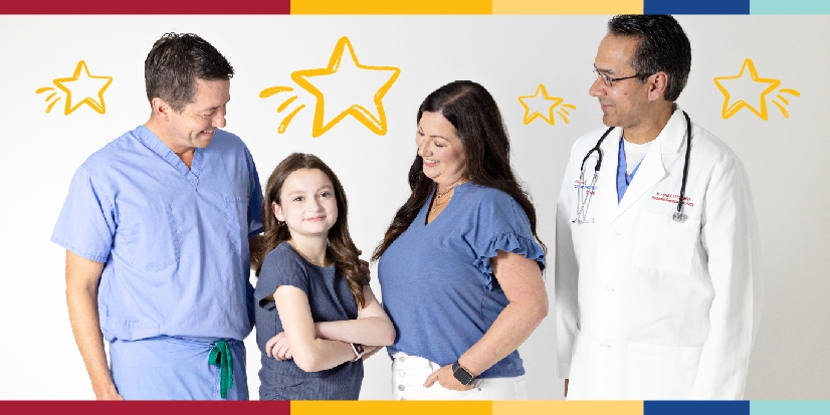Stephenson Cancer Center to Offer New Immune Therapy, CAR-T
- Category: News, Adults Services
- Posted On:
A revolutionary new treatment that harnesses the body’s own immune cells to fight tumors will be offered at the Stephenson Cancer Center at OU Health, beginning June 13.
Called CAR-T therapy, the treatment has been approved by the Food and Drug Administration and will be offered in Oklahoma only at the Stephenson Cancer Center. Its initial use is for two different blood cancers, one affecting children and the other affecting adults.
“CAR-T therapy is a major breakthrough for patients who have not improved with standard treatments,” said George Selby, M.D., director of the Transplant and Cellular Therapy Programat the Stephenson Cancer Center. “It is an immune therapy in which we’re harnessing our own cells to recognize cancer cells. That’s what a normal immune system does – it acts in a surveillance capacity so that when a malignant cell arises, it is killed by our immune system. CAR-T therapy is a way of ‘rebooting’ the immune system when it has failed.”
CAR-T therapy initially will be used to treat advanced lymphomas in adults. In the coming months, physicians anticipate offering similar treatment for acute lymphoblastic lymphoma in children and young adults. In both cases, patients must have failed to respond to standard chemotherapy or stem cell transplant.
CAR-T stands for Chimeric Antigen Receptor T-cell therapy. Patients being treated with CAR-T therapy will first have their blood collected at the Oklahoma Blood Institute in a process that is similar to a typical blood donation. T cells, a type of white blood cells involved in immunity, are filtered out and the plasma and red cells are returned to the patient. The T cells are then sent to a company that injects them with the gene for a chimeric antigen receptor, which is known to bind itself to cancer cells and activate the T cell. This process allows the newly engineered T cells to recognize and attack cancer with remarkable efficiency. Once the CAR-T cells are generated, they are shipped back to the Stephenson Cancer Center and given to the patient through an IV, much like a blood transfusion.
“Until the advent of CAR-T therapy, if a patient’s tumor came back after a stem cell transplant, their options were very limited, if they existed at all,” Selby said. “This is a major breakthrough for those patients for whom standard treatment has not been successful.”
Unlike other types of cancer therapies, CAR-T therapy is a one-time treatment. The T cells remain in the body and, if the cancer comes back, the cells reactivate to attack the tumors.
“These T cells go on to kill hundreds to thousands of tumor cells; the nickname for these cells is ‘serial killers,’” said Adam Asch, M.D., deputy director of the Stephenson Cancer Center and chief of the Division of Medical Oncology and Hematology.
Using the immune system to fight cancer has been the holy grail for oncologists, Asch said. In recent years, basic science research has yielded important information about how the immune system functions and has identified targets that enhance the killing efficiency of T cells. CAR-T therapy is especially exciting because of the excellent patient outcomes during clinical trials.
“The research data that led to the approval of CAR-T therapy has been extraordinary,” Asch said. “This therapy appears to be long-lasting in a high percentage of these patients.”
CAR-T therapy is incorporated into OU Health’s Stem Cell and Cellular Transplant Program, whose healthcare providers have received special training in the procedure and caring for patients. Selby provides leadership for the adult transplant program, joined by David Crawford, M.D., as head of the pediatric transplant group.
With time, the therapy's use will only grow. Clinical trials are underway studying the effectiveness of CAR-T therapy in treating other blood cancers, including multiple myeloma, as well as solid tumors. Another trial will study the effectiveness of CAR-T therapy as compared to transplant; CAR-T therapy potentially could move ahead of transplant as a treatment because of its ability to use the patient’s own immune system rather than someone else’s. The Stephenson Cancer Center will be participating in several such clinical trials.
CAR-T therapy joins a growing collection of resources at Stephenson Cancer Center. Since earning National Cancer Institute designation last year, Stephenson is among the top 2 percent of cancer centers in the nation and is a leader in improving the level of care and quality of life of patients with cancer.
“Our resources and personnel are unmatched because of NCI designation,” Selby said. “CAR-T therapy is among the first of many good things to come out of NCI designation for the Stephenson Cancer Center.”
To inquire about CAR-T therapy for adults at the Stephenson Cancer Center, visit the Transplant and Cellular Therapy Program page or call (405) 271-4022.
Learn more about CAR-T therapy from the National Cancer Institute
Watch video of the Stephenson Cancer Center's media briefing about CAR-T therapy (June 12, 2019)


.png)
